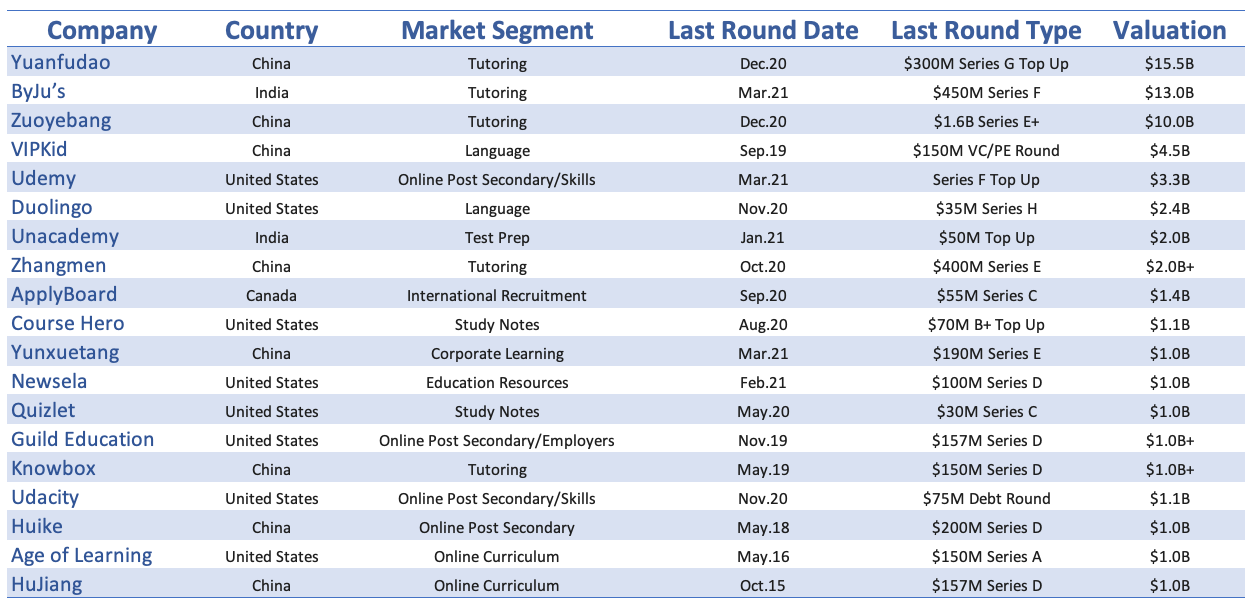- Coursera's first two quarters as a public company were solid, driven by demand for online education during the pandemic.
- However, rising competition poses a serious threat to Coursera's market position.
- I maintain a neutral view on the stock.
- A vast library of high-quality academic courses is provided through a freemium model (which means relatively low customer acquisition costs).
- Brand recognition that enables network effect.
- A growing learner base from all around the world both on the side of ordinary consumers and enterprises interested in upskilling of their employees.
- Coursera's gross profit was $60.9 million, or 59.7% of revenue, up 58% from $38.6 million a year ago.
- Net loss was $46.4 million or 45.4% of revenue, compared to $13.9 million, or 18.9% of revenue a year ago.
- Adjusted EBITDA was $2.9 million, or 2.8% of revenue, compared to $7.9 million, or 10.6% of revenue a year ago.
- Consumer revenue was $62 million, up 23% from a year ago, benefiting from demand for Coursera's professional certificates, which were targeted at entry-level digital jobs.
- The total number of paid enterprise clients increased to 584, up 109% from a year ago, and enterprise revenue was $28.2 million, up 69% from a year ago.
- Degrees revenue was up 78% from the previous year and reached $11.9 million.
Investment Thesis
Coursera (NYSE:COUR) is one of the oldest EdTech players with a strong foothold in the sector. Nonetheless, I see a serious risk that the company's approach to online education may become outdated compared to more flexible learning formats.
Even though the future of the EdTech industry is bright, it remains a question to what extent Coursera will be able to benefit from industry tailwinds. I'm neutral on the stock and don't see an attractive value proposition at the current share price.
The Current Picture
As a venture capitalist, I'm no stranger to Coursera. I invested in the company before the IPO and had to learn a lot about its business.
There are three mutually connected pillars of Coursera's business:
On the surface, this combination can be considered a solid foundation of a sustainable business. In a harsh EdTech reality, things are way more complicated.
Coursera's Financials
In Q2 2021, Coursera passed the $100 million revenue mark for the first time. Other metrics showed spectacular growth as well:
With so many people out of work and looking for a career change or working remotely and hoping to acquire new skills, all Coursera's segments - Consumer, Enterprise, and Degrees - saw a significant increase in revenue.
Despite the solid financial performance, there's a caveat: Coursera has only yet to demonstrate profitability in the upcoming years because of heightened investments in growth. To determine the probability that Coursera will successfully scale its success in the longer run, we need to understand what environment the company operates in.
Competition Will Keep Rising For Coursera
With a focus on high-quality academic courses from top universities, Coursera is in a weird market position given the current competitive landscape.
Udemy and edX, Coursera's rivals, were founded in the early 2010s, about the same time as Coursera. From today's perspective, I'd conclude that Udemy has been more responsive to the market's rapidly changing conditions.
New emerging digital career pathways, a potential source of revenue for online platforms, are hard to ignore, but at the same time, those courses require investment in content creation.
Coursera's current format doesn't allow for the rapid updates necessary to keep up with market transformation. For example, Blockchain courses were first introduced by Udemy, with Coursera following a couple of years later.
Udemy also provides more edutainment options. Whether users are interested in tarot reading or cooking, most Udemy courses can be completed in less than a day and come at comparatively low prices, attracting massive user enrollment.
Just like Coursera, edX offers free-to-audit courses with paid certificates from top universities. But what's more critical, edX also provides open-source functionality to develop your own Massive Open Online Courses (MOOC) site. According to this list, the Open edX platform powers more than 360 sites.
In the meantime, Coursera has no exclusive rights for courses it offers, which essentially makes the company just an intermediary between a user and universities. Such a model may work well in businesses with economies of scale (like Uber (NYSE:UBER) or Airbnb (NASDAQ:ABNB)), but this is not the case for Coursera.
Coursera's total operating expense in Q2 was $68.2 million, or 67% of revenue. Coursera's quality freemium content, created by the world's top educators, comes at a high cost regardless of the company's size.
This was only the tip of the iceberg. Coursera invests resources to localize the learner experience in fast-growing economies like India. Still, emerging local players could weaken Coursera's position in rapidly developing regions like Asia, Africa, and Latin America.
For example, in July, an African corporate education hub called Go1 raised $200 million. And CLASS101, a Seoul-based online education platform, announced that it just closed $25.8 million Series B funding to accelerate its growth in South Korea, the US, and Japan.
Overall, there are two dozens of EdTech companies with a valuation of over $1 billion who received funding in recent years, mainly from China:

Source: HolonIQ
Deglobalization trends across the world will only exacerbate the issue for Coursera and other global EdTech companies. Local players may get preferred funding from the government and lobby for integrating their courses into local curriculums, leaving little space for competition for global competitors.
Furthermore, even though Coursera is an incumbent player in the sector, the company is far from being an industry leader. According to the G2 Grid for the top Online Course Providers, based on user reviews and social networks data, Coursera ranks only among the top five companies.
Source: G2
The platform is ranked slightly lower than LinkedIn Academy, Udemy, and Pluralsight (NASDAQ:PS) (NASDAQ:PS). Skills in most categories - Business, Marketing, Computer Programming, IT Operations, and Career Development.
The Bottom Line
Coursera liberalized high-quality education by putting classic academic courses into a digital form. However, the lack of sustainable moat and rising competition on so many levels, in my opinion, are serious concerns to keep in mind for long-term investors.
The company hasn't been profitable and still won't be for at least 3-4 years. I see a high risk that new players who will properly scale flexible, fast-paced learning formats (especially with AI-powered personalization and tutoring) may leave relatively bulky, "old-fashioned" Coursera biting the dust.
Not to mention many local companies who will aggressively challenge global incumbents in regions with high-growth potential.
For me, as a venture capitalist, Coursera is a fascinating case. It emphasizes the importance of proper timing of an investment (particularly pre-IPO vs. post-IPO) and the importance of keeping a sober look at the company as industry trends develop.
At the pre-IPO stage, investing in Coursera turned out to be a great deal. Today, investing in Coursera as public equity seems like a far-fetched idea, at least until we see the stock in the range of $10-20 per share to justify the risks.
